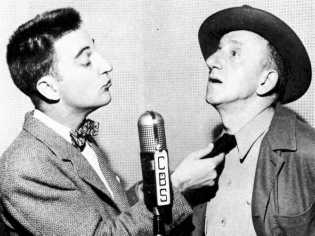|
I've Got To Sing A Torch Song
''I've Got to Sing a Torch Song'' is a 1933 Warner Bros. Merrie Melodies animated short film, directed by Tom Palmer (animator), Tom Palmer. The short was released on September 23, 1933. It premiered with ''I Loved a Woman'' in theaters. Plot The cartoon is a medley of gags set to the song "I've Got to Sing a Torch Song" and radio broadcasts. Characters, including caricatures of 1930s celebrities like Benito Mussolini and Greta Garbo, are seen in various locations like China, Africa, and New York City. Scenes feature humorous depictions of cultural stereotypes and celebrity impersonations, including Bing Crosby and James Cagney. The Statue of Liberty sings the title track, ending with a nod to Jimmy Durante. Ed Wynn's running gag with a cannon culminates in a misfire, sending him flying into his home where his family wears firemen hats. Production notes The cartoon features the song, "I've Got To Sing A Torch Song," written by Harry Warren and Al Dubin. "I've Got To Sing A Torch ... [...More Info...] [...Related Items...] OR: [Wikipedia] [Google] [Baidu] |
Tom Palmer (animator)
Thomas Augustin Palmer (' Antonio Giuseppe Alfonso Pipolo; 30 June 1902 – 21 November 1972) was an Italian-American animator, cartoon director, and U.S. training film supervisor. He was active in the animation industry throughout the 1920s and 1930s and was best known for his animation work at Walt Disney Animation Studios, Walt Disney Productions. He spent a good chunk of his later career directing training films for the United States Army. Career Early career Palmer was born in New York City with the surname of "Pipolo", but later changed his name to Palmer. One of his brothers, Frank Pipolo, was a decorated New York City police officer. Palmer first worked in Marine insurance, marine insurance brokerage, but he later started his career in animation working on Mutt and Jeff cartoons. He subsequently worked at the List of animation studios, Winkler Studio in 1928, where he directed and animated Oswald the Lucky Rabbit cartoons. When Walter Lantz took over the Oswald series in ... [...More Info...] [...Related Items...] OR: [Wikipedia] [Google] [Baidu] |
Jimmy Durante
James Francis Durante ( , ; February 10, 1893 – January 29, 1980) was an American comedian, actor, singer, and pianist. His distinctive gravelly speech, Lower East Side New York accent, accent, comic language-butchery, jazz-influenced songs, and prominent nose helped make him one of the United States' most familiar and popular personalities of the 1920s through the 1970s. He often referred to his nose as ''the schnozzola'' (Italianization of the American Yiddish slang word ''schnoz'', meaning "big nose"), and the word became his nickname. Early life Childhood Durante was born on the Lower East Side of New York City. He was the youngest of four children born to Rosa (née Lentino) and Bartolomeo Durante, both immigrants from Salerno, Campania, Italy. Bartolomeo was a barber. Durante served as an Altar server#Altar servers in the Catholic Church, altar boy at St. Malachy Roman Catholic Church, known as the Actor's Chapel. Early career Durante dropped out of school in seven ... [...More Info...] [...Related Items...] OR: [Wikipedia] [Google] [Baidu] |
Cultural Depictions Of Greta Garbo
Culture ( ) is a concept that encompasses the social behavior, institutions, and norms found in human societies, as well as the knowledge, beliefs, arts, laws, customs, capabilities, attitudes, and habits of the individuals in these groups.Tylor, Edward. (1871). ''Primitive Culture''. Vol 1. New York: J. P. Putnam's Son Culture often originates from or is attributed to a specific region or location. Humans acquire culture through the learning processes of enculturation and socialization, which is shown by the diversity of cultures across societies. A cultural norm codifies acceptable conduct in society; it serves as a guideline for behavior, dress, language, and demeanor in a situation, which serves as a template for expectations in a social group. Accepting only a monoculture in a social group can bear risks, just as a single species can wither in the face of environmental change, for lack of functional responses to the change. Thus in military culture, valor is counted a ... [...More Info...] [...Related Items...] OR: [Wikipedia] [Google] [Baidu] |

